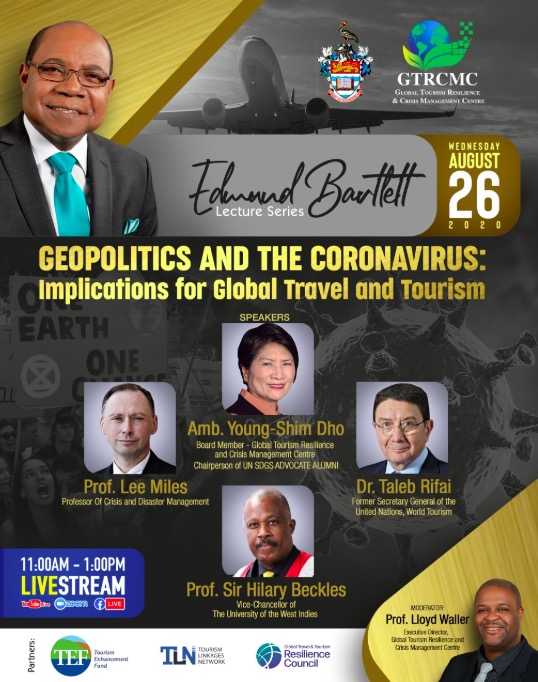11 Aug 2020
Geopolitical impact of Covid-19 pandemic enters the agendas of global Travel & Tourism forums
Bangkok – The far-reaching geopolitical impact of the Covid-19 pandemic on the future of tourism is to be the topic of a game-changing webinar to be organised by the Jamaican Tourism Minister Edmund Bartlett on Aug 26.
Former UN World Tourism Organisation Secretary-General Dr Taleb Rifai and Chairperson of the UN SDGs Advocate Alumni Ambassador Young-Shim Dho are two of the other speakers in the webinar to be held under the aegis of Global Tourism Resilience and Crisis Management Centre. See details in the infographic below.

The topic will elevate the agendas of global Travel & Tourism forums to an entirely new level, breaking through the comfort zones of resilience-and-recovery packages and examining the deeper and long-term consequences of the pandemic, beyond the parochial focus on bailouts and bubbles.
Explaining the context of the webinar, Mr Bartlett said that it has generally become difficult or even virtually impossible for many global leaders to escape the political impact of their policy responses to the pandemic. Some global leaders are facing moral dilemmas in which generally-accepted policy responses to the pandemic have clashed with narrow political interests.
The resulting emergence of sharp ideological divisions, both internal and external, have in turn triggered a proliferation of conspiracy and fringe theories, xenophobic suspicions and fears, and widespread perception of attacks on traditional values and freedoms, he said.
All of these impact on tourism, by leading to “an adverse disposition towards international travel, fervent nationalistic values and attitudes, a fear or resentment of other cultures and increasing insularity or narrowmindedness.”
The minister added, “Inefficacy at national levels in managing the pandemic, can prevent the timely recovery of international tourism or undo gains made in other countries especially since many countries with high recovery rates have now decided to reopen their borders to international tourists,.”
Against this backdrop, the webinar will focus on important questions:
- How will geopolitical developments in major source markets such as the US and China affect the recovery of international tourism?
- Will destination attractiveness and tourist preferences be increasingly shaped by geopolitical considerations in the post- COVID19 era?
- In light of the fact that tourism is based on the cross-border movements of millions of people, what happens when incompatible geo-political values and attitudes collide?
- How can small tourism-dependent economies, especially those that have done fairly well at containing the pandemic, protect themselves from elevated infection risks originating from major source markets without compromising their fragile economies?
- Does the Caribbean now need to look to more geopolitically-compatible source markets ??
- What will the future of tourism look like for regions such as the Middle East, Latin America, Africa, Asia and the Caribbean?
Mr Bartlett indicated that democratic systems, individual freedoms and global power struggles were now all part of the geopolitical impact agenda in future. “While the long-term geopolitical implications of the pandemic are yet to be fully measured, we have already seen compelling evidence that a range of economic, political, geographical and cultural factors have differentiated responses across countries,” he said.
“For one, the COVID-19 pandemic has reinforced the power of the state in its traditional role as protector of society which sets up a potential situation where the state could assume an expanded world in the post-COVID19 international system. This would constitute an ideological depart from recent trend towards a minimal state.
“Importantly, some of the preeminent global powers have struggled with how to balance competing interests at both the national and global levels including; national interests versus global cooperation, rights and freedoms versus public security, individual choice versus consensus-building, economic security versus health security, political/ religious ideologies versus science and idealism versus realism.
“Among global powers, there has been great anxiety that weakening economies and increased political instability at home will exacerbate vulnerabilities and weaken their power position in global politics relative to their strongest competitors. In particular, it is feared that some global powers will seize the opportunity, in the midst of the crisis, to expand their sphere of influence into now vulnerable territories under the guise of benevolent intervention.”
Mr Bartlett added, “The strong evidence of the far-reaching geopolitical impact and consequences of the pandemic necessitates that we deepen our understanding of how emerging or expanded geopolitical considerations are likely to affect the post-COVID19 world order. It is also important that we invite national, regional and global policy leaders including the World Health Organisation, the UNWTO, among others to share insights and experiences that will allow us to identify and discuss specific geopolitical issues and risks within the context of COVID-19, ways to manage these risks, and how current geopolitical developments are likely to reshape in the future.”
